HNC Business (Unit 9): Entrepreneurship and Small Business Report
VerifiedAdded on 2020/10/23
|16
|4715
|279
Report
AI Summary
This report delves into the multifaceted world of entrepreneurship and small business management, providing a comprehensive overview of various entrepreneurial ventures, including small, medium, and micro businesses. It explores the different typologies of ventures, such as defenders, prospectors, analysers, and reactors, and examines the similarities and differences between them, using examples like Michelle Mone, Richard James Anderson, and Emma Hellier. The report analyzes the impact of micro and small businesses on the economy, highlighting their role in job creation, innovation, and economic growth. Furthermore, it identifies and evaluates the characteristics, traits, and skills of successful entrepreneurs, with a specific focus on Jack Cohen, the founder of Tesco. The analysis considers how an entrepreneur's background and experience can either foster or hinder entrepreneurial endeavors, providing a well-rounded perspective on the subject.
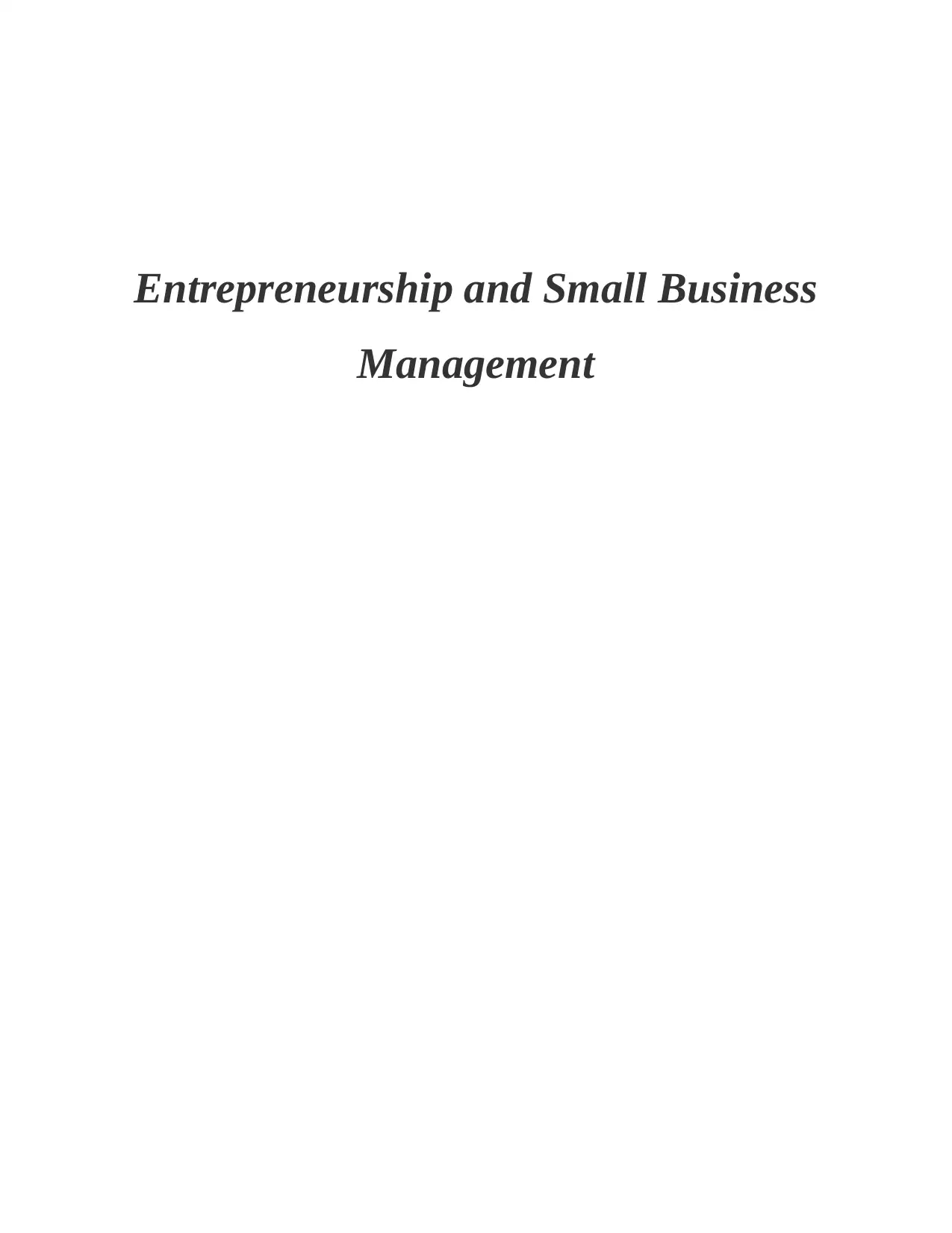
Entrepreneurship and Small Business
Management
Management
Paraphrase This Document
Need a fresh take? Get an instant paraphrase of this document with our AI Paraphraser
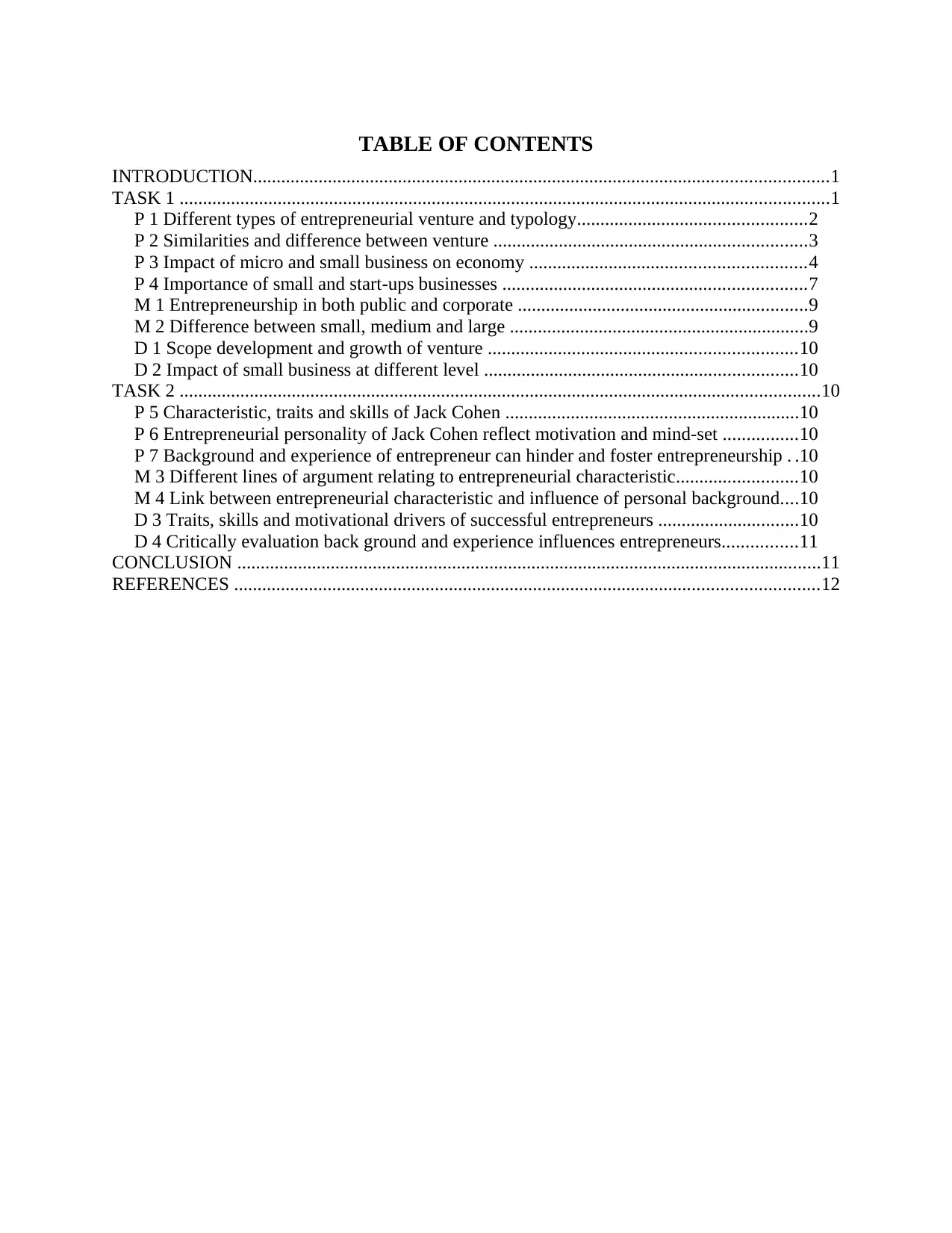
TABLE OF CONTENTS
INTRODUCTION...........................................................................................................................1
TASK 1 ...........................................................................................................................................1
P 1 Different types of entrepreneurial venture and typology.................................................2
P 2 Similarities and difference between venture ...................................................................3
P 3 Impact of micro and small business on economy ...........................................................4
P 4 Importance of small and start-ups businesses .................................................................7
M 1 Entrepreneurship in both public and corporate ..............................................................9
M 2 Difference between small, medium and large ................................................................9
D 1 Scope development and growth of venture ..................................................................10
D 2 Impact of small business at different level ...................................................................10
TASK 2 .........................................................................................................................................10
P 5 Characteristic, traits and skills of Jack Cohen ...............................................................10
P 6 Entrepreneurial personality of Jack Cohen reflect motivation and mind-set ................10
P 7 Background and experience of entrepreneur can hinder and foster entrepreneurship . .10
M 3 Different lines of argument relating to entrepreneurial characteristic..........................10
M 4 Link between entrepreneurial characteristic and influence of personal background....10
D 3 Traits, skills and motivational drivers of successful entrepreneurs ..............................10
D 4 Critically evaluation back ground and experience influences entrepreneurs................11
CONCLUSION .............................................................................................................................11
REFERENCES .............................................................................................................................12
INTRODUCTION...........................................................................................................................1
TASK 1 ...........................................................................................................................................1
P 1 Different types of entrepreneurial venture and typology.................................................2
P 2 Similarities and difference between venture ...................................................................3
P 3 Impact of micro and small business on economy ...........................................................4
P 4 Importance of small and start-ups businesses .................................................................7
M 1 Entrepreneurship in both public and corporate ..............................................................9
M 2 Difference between small, medium and large ................................................................9
D 1 Scope development and growth of venture ..................................................................10
D 2 Impact of small business at different level ...................................................................10
TASK 2 .........................................................................................................................................10
P 5 Characteristic, traits and skills of Jack Cohen ...............................................................10
P 6 Entrepreneurial personality of Jack Cohen reflect motivation and mind-set ................10
P 7 Background and experience of entrepreneur can hinder and foster entrepreneurship . .10
M 3 Different lines of argument relating to entrepreneurial characteristic..........................10
M 4 Link between entrepreneurial characteristic and influence of personal background....10
D 3 Traits, skills and motivational drivers of successful entrepreneurs ..............................10
D 4 Critically evaluation back ground and experience influences entrepreneurs................11
CONCLUSION .............................................................................................................................11
REFERENCES .............................................................................................................................12
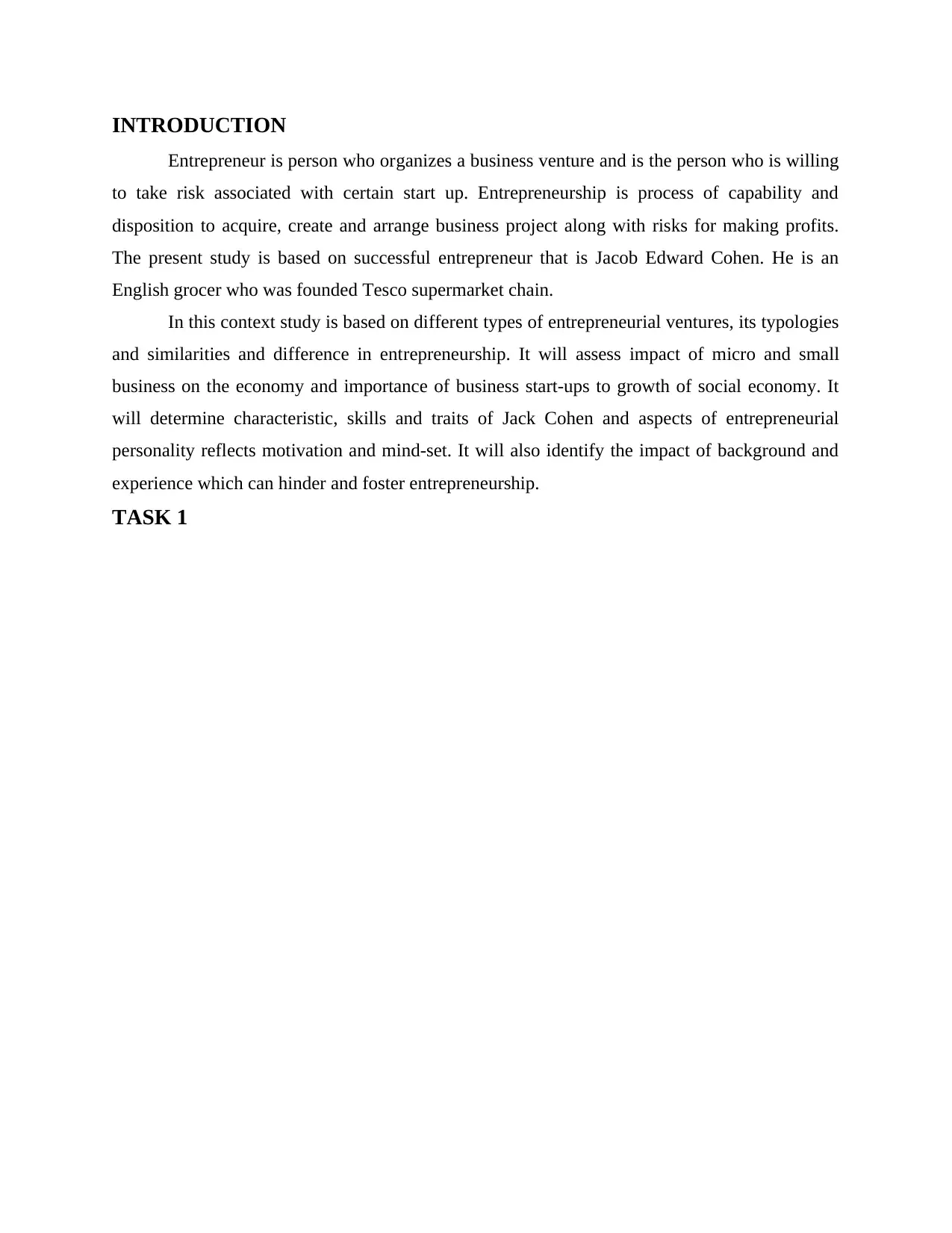
INTRODUCTION
Entrepreneur is person who organizes a business venture and is the person who is willing
to take risk associated with certain start up. Entrepreneurship is process of capability and
disposition to acquire, create and arrange business project along with risks for making profits.
The present study is based on successful entrepreneur that is Jacob Edward Cohen. He is an
English grocer who was founded Tesco supermarket chain.
In this context study is based on different types of entrepreneurial ventures, its typologies
and similarities and difference in entrepreneurship. It will assess impact of micro and small
business on the economy and importance of business start-ups to growth of social economy. It
will determine characteristic, skills and traits of Jack Cohen and aspects of entrepreneurial
personality reflects motivation and mind-set. It will also identify the impact of background and
experience which can hinder and foster entrepreneurship.
TASK 1
Entrepreneur is person who organizes a business venture and is the person who is willing
to take risk associated with certain start up. Entrepreneurship is process of capability and
disposition to acquire, create and arrange business project along with risks for making profits.
The present study is based on successful entrepreneur that is Jacob Edward Cohen. He is an
English grocer who was founded Tesco supermarket chain.
In this context study is based on different types of entrepreneurial ventures, its typologies
and similarities and difference in entrepreneurship. It will assess impact of micro and small
business on the economy and importance of business start-ups to growth of social economy. It
will determine characteristic, skills and traits of Jack Cohen and aspects of entrepreneurial
personality reflects motivation and mind-set. It will also identify the impact of background and
experience which can hinder and foster entrepreneurship.
TASK 1
⊘ This is a preview!⊘
Do you want full access?
Subscribe today to unlock all pages.

Trusted by 1+ million students worldwide
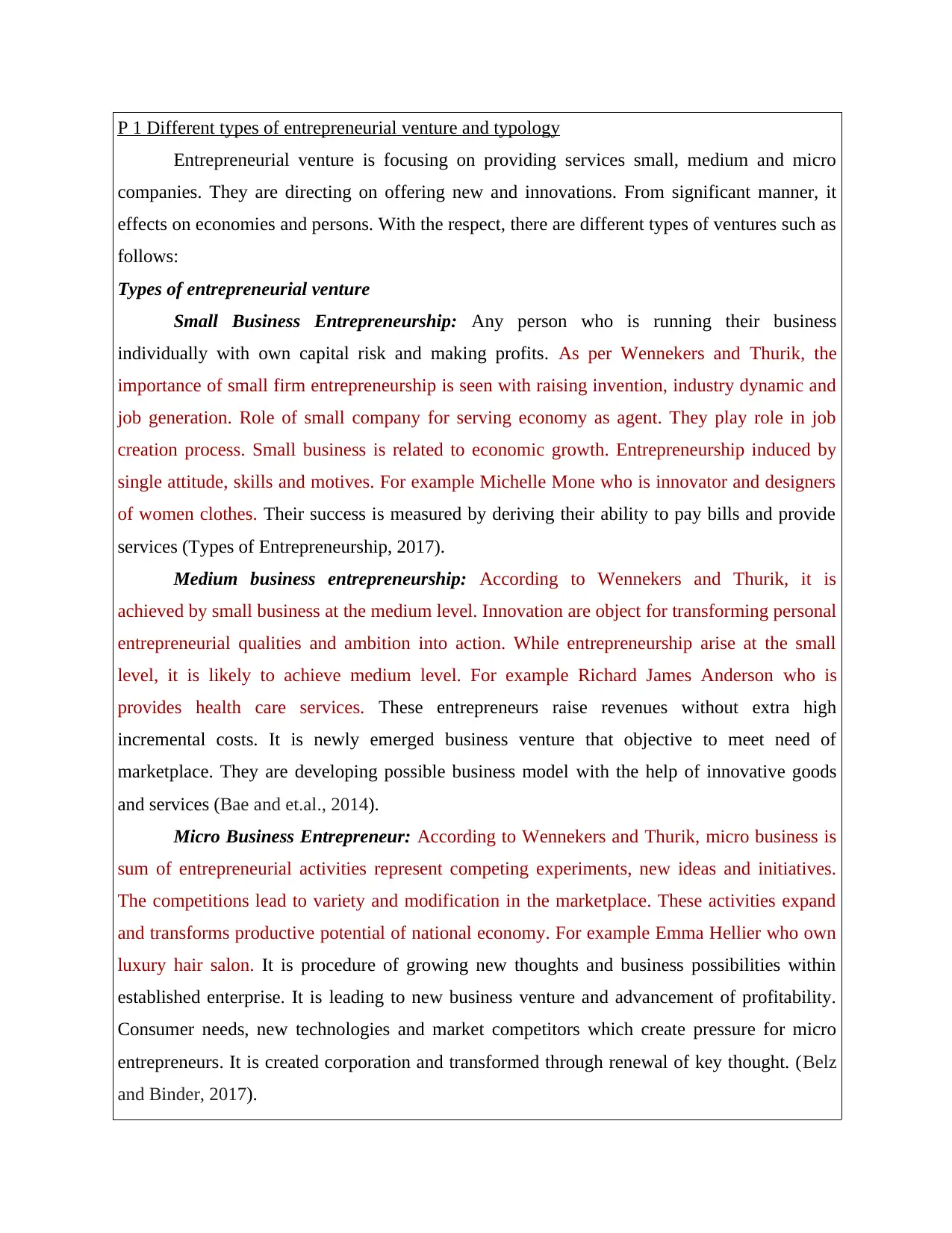
P 1 Different types of entrepreneurial venture and typology
Entrepreneurial venture is focusing on providing services small, medium and micro
companies. They are directing on offering new and innovations. From significant manner, it
effects on economies and persons. With the respect, there are different types of ventures such as
follows:
Types of entrepreneurial venture
Small Business Entrepreneurship: Any person who is running their business
individually with own capital risk and making profits. As per Wennekers and Thurik, the
importance of small firm entrepreneurship is seen with raising invention, industry dynamic and
job generation. Role of small company for serving economy as agent. They play role in job
creation process. Small business is related to economic growth. Entrepreneurship induced by
single attitude, skills and motives. For example Michelle Mone who is innovator and designers
of women clothes. Their success is measured by deriving their ability to pay bills and provide
services (Types of Entrepreneurship, 2017).
Medium business entrepreneurship: According to Wennekers and Thurik, it is
achieved by small business at the medium level. Innovation are object for transforming personal
entrepreneurial qualities and ambition into action. While entrepreneurship arise at the small
level, it is likely to achieve medium level. For example Richard James Anderson who is
provides health care services. These entrepreneurs raise revenues without extra high
incremental costs. It is newly emerged business venture that objective to meet need of
marketplace. They are developing possible business model with the help of innovative goods
and services (Bae and et.al., 2014).
Micro Business Entrepreneur: According to Wennekers and Thurik, micro business is
sum of entrepreneurial activities represent competing experiments, new ideas and initiatives.
The competitions lead to variety and modification in the marketplace. These activities expand
and transforms productive potential of national economy. For example Emma Hellier who own
luxury hair salon. It is procedure of growing new thoughts and business possibilities within
established enterprise. It is leading to new business venture and advancement of profitability.
Consumer needs, new technologies and market competitors which create pressure for micro
entrepreneurs. It is created corporation and transformed through renewal of key thought. (Belz
and Binder, 2017).
Entrepreneurial venture is focusing on providing services small, medium and micro
companies. They are directing on offering new and innovations. From significant manner, it
effects on economies and persons. With the respect, there are different types of ventures such as
follows:
Types of entrepreneurial venture
Small Business Entrepreneurship: Any person who is running their business
individually with own capital risk and making profits. As per Wennekers and Thurik, the
importance of small firm entrepreneurship is seen with raising invention, industry dynamic and
job generation. Role of small company for serving economy as agent. They play role in job
creation process. Small business is related to economic growth. Entrepreneurship induced by
single attitude, skills and motives. For example Michelle Mone who is innovator and designers
of women clothes. Their success is measured by deriving their ability to pay bills and provide
services (Types of Entrepreneurship, 2017).
Medium business entrepreneurship: According to Wennekers and Thurik, it is
achieved by small business at the medium level. Innovation are object for transforming personal
entrepreneurial qualities and ambition into action. While entrepreneurship arise at the small
level, it is likely to achieve medium level. For example Richard James Anderson who is
provides health care services. These entrepreneurs raise revenues without extra high
incremental costs. It is newly emerged business venture that objective to meet need of
marketplace. They are developing possible business model with the help of innovative goods
and services (Bae and et.al., 2014).
Micro Business Entrepreneur: According to Wennekers and Thurik, micro business is
sum of entrepreneurial activities represent competing experiments, new ideas and initiatives.
The competitions lead to variety and modification in the marketplace. These activities expand
and transforms productive potential of national economy. For example Emma Hellier who own
luxury hair salon. It is procedure of growing new thoughts and business possibilities within
established enterprise. It is leading to new business venture and advancement of profitability.
Consumer needs, new technologies and market competitors which create pressure for micro
entrepreneurs. It is created corporation and transformed through renewal of key thought. (Belz
and Binder, 2017).
Paraphrase This Document
Need a fresh take? Get an instant paraphrase of this document with our AI Paraphraser
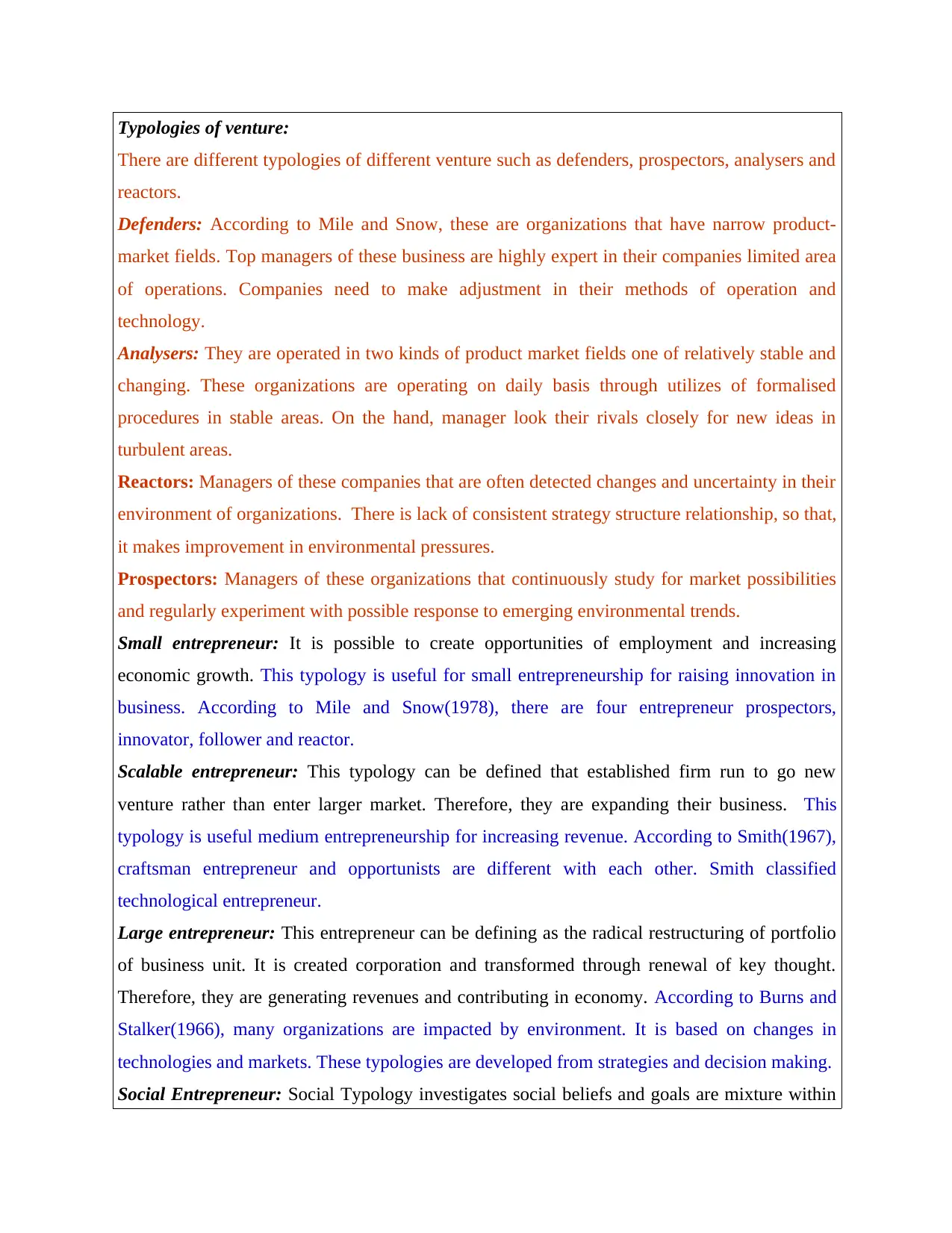
Typologies of venture:
There are different typologies of different venture such as defenders, prospectors, analysers and
reactors.
Defenders: According to Mile and Snow, these are organizations that have narrow product-
market fields. Top managers of these business are highly expert in their companies limited area
of operations. Companies need to make adjustment in their methods of operation and
technology.
Analysers: They are operated in two kinds of product market fields one of relatively stable and
changing. These organizations are operating on daily basis through utilizes of formalised
procedures in stable areas. On the hand, manager look their rivals closely for new ideas in
turbulent areas.
Reactors: Managers of these companies that are often detected changes and uncertainty in their
environment of organizations. There is lack of consistent strategy structure relationship, so that,
it makes improvement in environmental pressures.
Prospectors: Managers of these organizations that continuously study for market possibilities
and regularly experiment with possible response to emerging environmental trends.
Small entrepreneur: It is possible to create opportunities of employment and increasing
economic growth. This typology is useful for small entrepreneurship for raising innovation in
business. According to Mile and Snow(1978), there are four entrepreneur prospectors,
innovator, follower and reactor.
Scalable entrepreneur: This typology can be defined that established firm run to go new
venture rather than enter larger market. Therefore, they are expanding their business. This
typology is useful medium entrepreneurship for increasing revenue. According to Smith(1967),
craftsman entrepreneur and opportunists are different with each other. Smith classified
technological entrepreneur.
Large entrepreneur: This entrepreneur can be defining as the radical restructuring of portfolio
of business unit. It is created corporation and transformed through renewal of key thought.
Therefore, they are generating revenues and contributing in economy. According to Burns and
Stalker(1966), many organizations are impacted by environment. It is based on changes in
technologies and markets. These typologies are developed from strategies and decision making.
Social Entrepreneur: Social Typology investigates social beliefs and goals are mixture within
There are different typologies of different venture such as defenders, prospectors, analysers and
reactors.
Defenders: According to Mile and Snow, these are organizations that have narrow product-
market fields. Top managers of these business are highly expert in their companies limited area
of operations. Companies need to make adjustment in their methods of operation and
technology.
Analysers: They are operated in two kinds of product market fields one of relatively stable and
changing. These organizations are operating on daily basis through utilizes of formalised
procedures in stable areas. On the hand, manager look their rivals closely for new ideas in
turbulent areas.
Reactors: Managers of these companies that are often detected changes and uncertainty in their
environment of organizations. There is lack of consistent strategy structure relationship, so that,
it makes improvement in environmental pressures.
Prospectors: Managers of these organizations that continuously study for market possibilities
and regularly experiment with possible response to emerging environmental trends.
Small entrepreneur: It is possible to create opportunities of employment and increasing
economic growth. This typology is useful for small entrepreneurship for raising innovation in
business. According to Mile and Snow(1978), there are four entrepreneur prospectors,
innovator, follower and reactor.
Scalable entrepreneur: This typology can be defined that established firm run to go new
venture rather than enter larger market. Therefore, they are expanding their business. This
typology is useful medium entrepreneurship for increasing revenue. According to Smith(1967),
craftsman entrepreneur and opportunists are different with each other. Smith classified
technological entrepreneur.
Large entrepreneur: This entrepreneur can be defining as the radical restructuring of portfolio
of business unit. It is created corporation and transformed through renewal of key thought.
Therefore, they are generating revenues and contributing in economy. According to Burns and
Stalker(1966), many organizations are impacted by environment. It is based on changes in
technologies and markets. These typologies are developed from strategies and decision making.
Social Entrepreneur: Social Typology investigates social beliefs and goals are mixture within
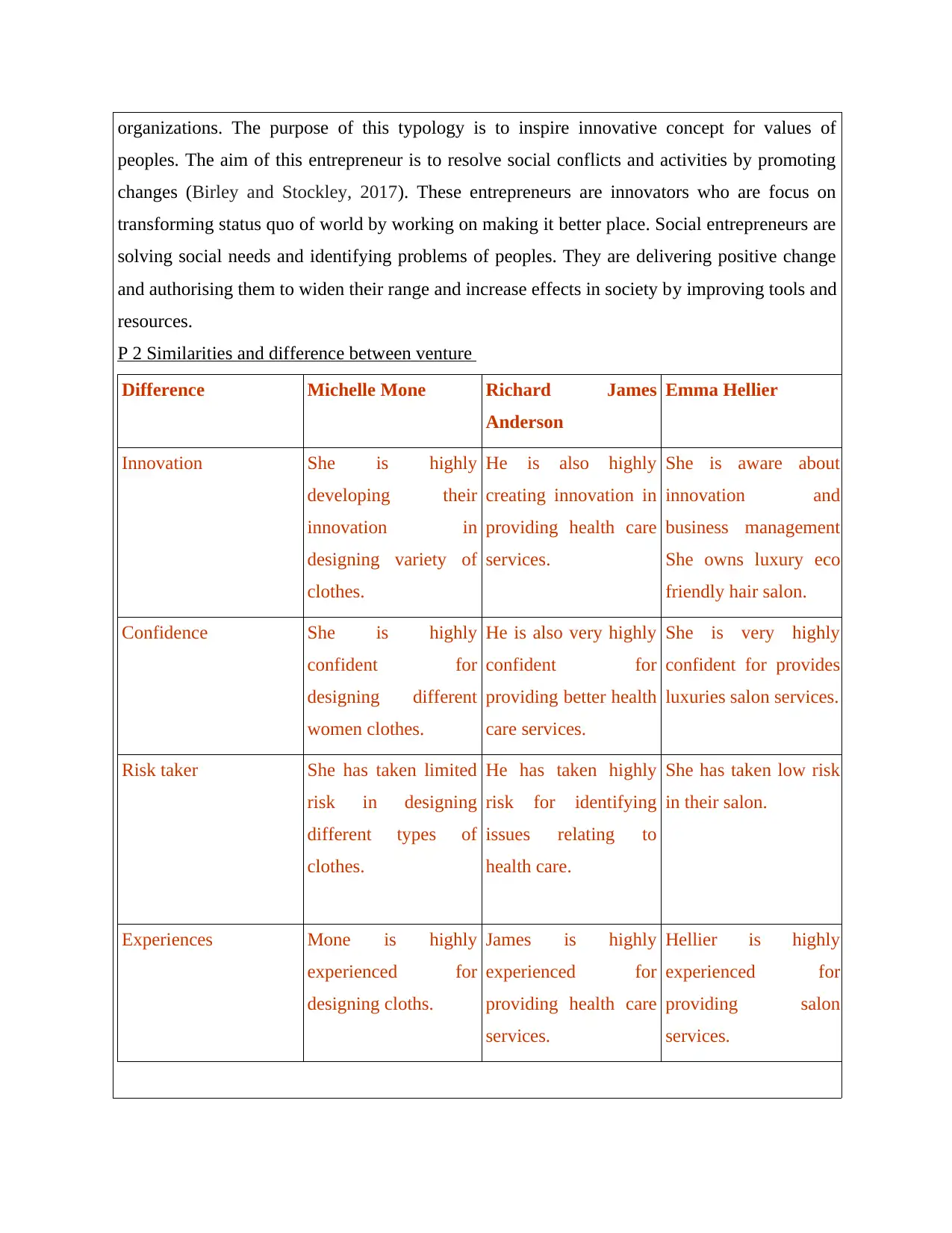
organizations. The purpose of this typology is to inspire innovative concept for values of
peoples. The aim of this entrepreneur is to resolve social conflicts and activities by promoting
changes (Birley and Stockley, 2017). These entrepreneurs are innovators who are focus on
transforming status quo of world by working on making it better place. Social entrepreneurs are
solving social needs and identifying problems of peoples. They are delivering positive change
and authorising them to widen their range and increase effects in society by improving tools and
resources.
P 2 Similarities and difference between venture
Difference Michelle Mone Richard James
Anderson
Emma Hellier
Innovation She is highly
developing their
innovation in
designing variety of
clothes.
He is also highly
creating innovation in
providing health care
services.
She is aware about
innovation and
business management
She owns luxury eco
friendly hair salon.
Confidence She is highly
confident for
designing different
women clothes.
He is also very highly
confident for
providing better health
care services.
She is very highly
confident for provides
luxuries salon services.
Risk taker She has taken limited
risk in designing
different types of
clothes.
He has taken highly
risk for identifying
issues relating to
health care.
She has taken low risk
in their salon.
Experiences Mone is highly
experienced for
designing cloths.
James is highly
experienced for
providing health care
services.
Hellier is highly
experienced for
providing salon
services.
peoples. The aim of this entrepreneur is to resolve social conflicts and activities by promoting
changes (Birley and Stockley, 2017). These entrepreneurs are innovators who are focus on
transforming status quo of world by working on making it better place. Social entrepreneurs are
solving social needs and identifying problems of peoples. They are delivering positive change
and authorising them to widen their range and increase effects in society by improving tools and
resources.
P 2 Similarities and difference between venture
Difference Michelle Mone Richard James
Anderson
Emma Hellier
Innovation She is highly
developing their
innovation in
designing variety of
clothes.
He is also highly
creating innovation in
providing health care
services.
She is aware about
innovation and
business management
She owns luxury eco
friendly hair salon.
Confidence She is highly
confident for
designing different
women clothes.
He is also very highly
confident for
providing better health
care services.
She is very highly
confident for provides
luxuries salon services.
Risk taker She has taken limited
risk in designing
different types of
clothes.
He has taken highly
risk for identifying
issues relating to
health care.
She has taken low risk
in their salon.
Experiences Mone is highly
experienced for
designing cloths.
James is highly
experienced for
providing health care
services.
Hellier is highly
experienced for
providing salon
services.
⊘ This is a preview!⊘
Do you want full access?
Subscribe today to unlock all pages.

Trusted by 1+ million students worldwide
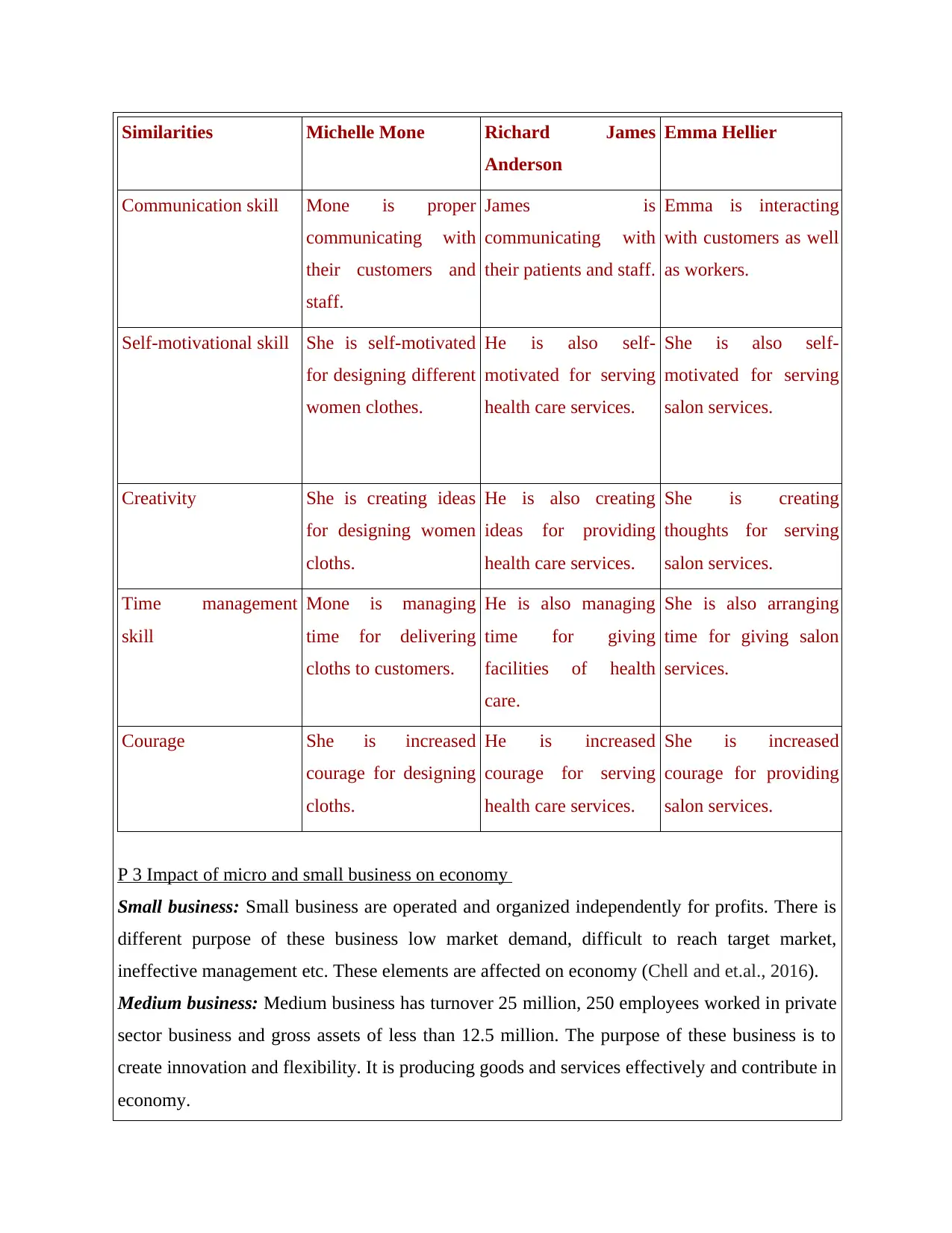
Similarities Michelle Mone Richard James
Anderson
Emma Hellier
Communication skill Mone is proper
communicating with
their customers and
staff.
James is
communicating with
their patients and staff.
Emma is interacting
with customers as well
as workers.
Self-motivational skill She is self-motivated
for designing different
women clothes.
He is also self-
motivated for serving
health care services.
She is also self-
motivated for serving
salon services.
Creativity She is creating ideas
for designing women
cloths.
He is also creating
ideas for providing
health care services.
She is creating
thoughts for serving
salon services.
Time management
skill
Mone is managing
time for delivering
cloths to customers.
He is also managing
time for giving
facilities of health
care.
She is also arranging
time for giving salon
services.
Courage She is increased
courage for designing
cloths.
He is increased
courage for serving
health care services.
She is increased
courage for providing
salon services.
P 3 Impact of micro and small business on economy
Small business: Small business are operated and organized independently for profits. There is
different purpose of these business low market demand, difficult to reach target market,
ineffective management etc. These elements are affected on economy (Chell and et.al., 2016).
Medium business: Medium business has turnover 25 million, 250 employees worked in private
sector business and gross assets of less than 12.5 million. The purpose of these business is to
create innovation and flexibility. It is producing goods and services effectively and contribute in
economy.
Anderson
Emma Hellier
Communication skill Mone is proper
communicating with
their customers and
staff.
James is
communicating with
their patients and staff.
Emma is interacting
with customers as well
as workers.
Self-motivational skill She is self-motivated
for designing different
women clothes.
He is also self-
motivated for serving
health care services.
She is also self-
motivated for serving
salon services.
Creativity She is creating ideas
for designing women
cloths.
He is also creating
ideas for providing
health care services.
She is creating
thoughts for serving
salon services.
Time management
skill
Mone is managing
time for delivering
cloths to customers.
He is also managing
time for giving
facilities of health
care.
She is also arranging
time for giving salon
services.
Courage She is increased
courage for designing
cloths.
He is increased
courage for serving
health care services.
She is increased
courage for providing
salon services.
P 3 Impact of micro and small business on economy
Small business: Small business are operated and organized independently for profits. There is
different purpose of these business low market demand, difficult to reach target market,
ineffective management etc. These elements are affected on economy (Chell and et.al., 2016).
Medium business: Medium business has turnover 25 million, 250 employees worked in private
sector business and gross assets of less than 12.5 million. The purpose of these business is to
create innovation and flexibility. It is producing goods and services effectively and contribute in
economy.
Paraphrase This Document
Need a fresh take? Get an instant paraphrase of this document with our AI Paraphraser
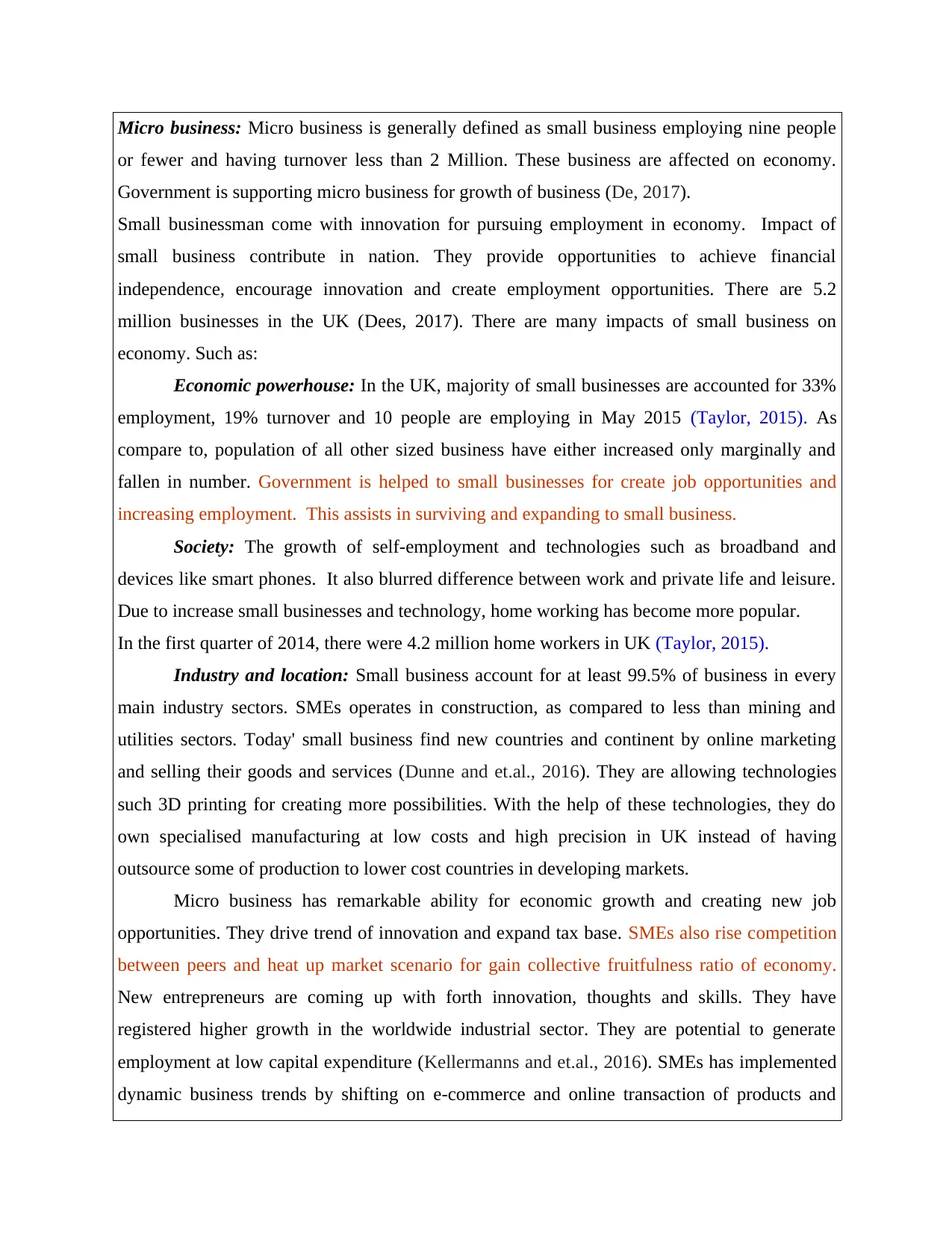
Micro business: Micro business is generally defined as small business employing nine people
or fewer and having turnover less than 2 Million. These business are affected on economy.
Government is supporting micro business for growth of business (De, 2017).
Small businessman come with innovation for pursuing employment in economy. Impact of
small business contribute in nation. They provide opportunities to achieve financial
independence, encourage innovation and create employment opportunities. There are 5.2
million businesses in the UK (Dees, 2017). There are many impacts of small business on
economy. Such as:
Economic powerhouse: In the UK, majority of small businesses are accounted for 33%
employment, 19% turnover and 10 people are employing in May 2015 (Taylor, 2015). As
compare to, population of all other sized business have either increased only marginally and
fallen in number. Government is helped to small businesses for create job opportunities and
increasing employment. This assists in surviving and expanding to small business.
Society: The growth of self-employment and technologies such as broadband and
devices like smart phones. It also blurred difference between work and private life and leisure.
Due to increase small businesses and technology, home working has become more popular.
In the first quarter of 2014, there were 4.2 million home workers in UK (Taylor, 2015).
Industry and location: Small business account for at least 99.5% of business in every
main industry sectors. SMEs operates in construction, as compared to less than mining and
utilities sectors. Today' small business find new countries and continent by online marketing
and selling their goods and services (Dunne and et.al., 2016). They are allowing technologies
such 3D printing for creating more possibilities. With the help of these technologies, they do
own specialised manufacturing at low costs and high precision in UK instead of having
outsource some of production to lower cost countries in developing markets.
Micro business has remarkable ability for economic growth and creating new job
opportunities. They drive trend of innovation and expand tax base. SMEs also rise competition
between peers and heat up market scenario for gain collective fruitfulness ratio of economy.
New entrepreneurs are coming up with forth innovation, thoughts and skills. They have
registered higher growth in the worldwide industrial sector. They are potential to generate
employment at low capital expenditure (Kellermanns and et.al., 2016). SMEs has implemented
dynamic business trends by shifting on e-commerce and online transaction of products and
or fewer and having turnover less than 2 Million. These business are affected on economy.
Government is supporting micro business for growth of business (De, 2017).
Small businessman come with innovation for pursuing employment in economy. Impact of
small business contribute in nation. They provide opportunities to achieve financial
independence, encourage innovation and create employment opportunities. There are 5.2
million businesses in the UK (Dees, 2017). There are many impacts of small business on
economy. Such as:
Economic powerhouse: In the UK, majority of small businesses are accounted for 33%
employment, 19% turnover and 10 people are employing in May 2015 (Taylor, 2015). As
compare to, population of all other sized business have either increased only marginally and
fallen in number. Government is helped to small businesses for create job opportunities and
increasing employment. This assists in surviving and expanding to small business.
Society: The growth of self-employment and technologies such as broadband and
devices like smart phones. It also blurred difference between work and private life and leisure.
Due to increase small businesses and technology, home working has become more popular.
In the first quarter of 2014, there were 4.2 million home workers in UK (Taylor, 2015).
Industry and location: Small business account for at least 99.5% of business in every
main industry sectors. SMEs operates in construction, as compared to less than mining and
utilities sectors. Today' small business find new countries and continent by online marketing
and selling their goods and services (Dunne and et.al., 2016). They are allowing technologies
such 3D printing for creating more possibilities. With the help of these technologies, they do
own specialised manufacturing at low costs and high precision in UK instead of having
outsource some of production to lower cost countries in developing markets.
Micro business has remarkable ability for economic growth and creating new job
opportunities. They drive trend of innovation and expand tax base. SMEs also rise competition
between peers and heat up market scenario for gain collective fruitfulness ratio of economy.
New entrepreneurs are coming up with forth innovation, thoughts and skills. They have
registered higher growth in the worldwide industrial sector. They are potential to generate
employment at low capital expenditure (Kellermanns and et.al., 2016). SMEs has implemented
dynamic business trends by shifting on e-commerce and online transaction of products and
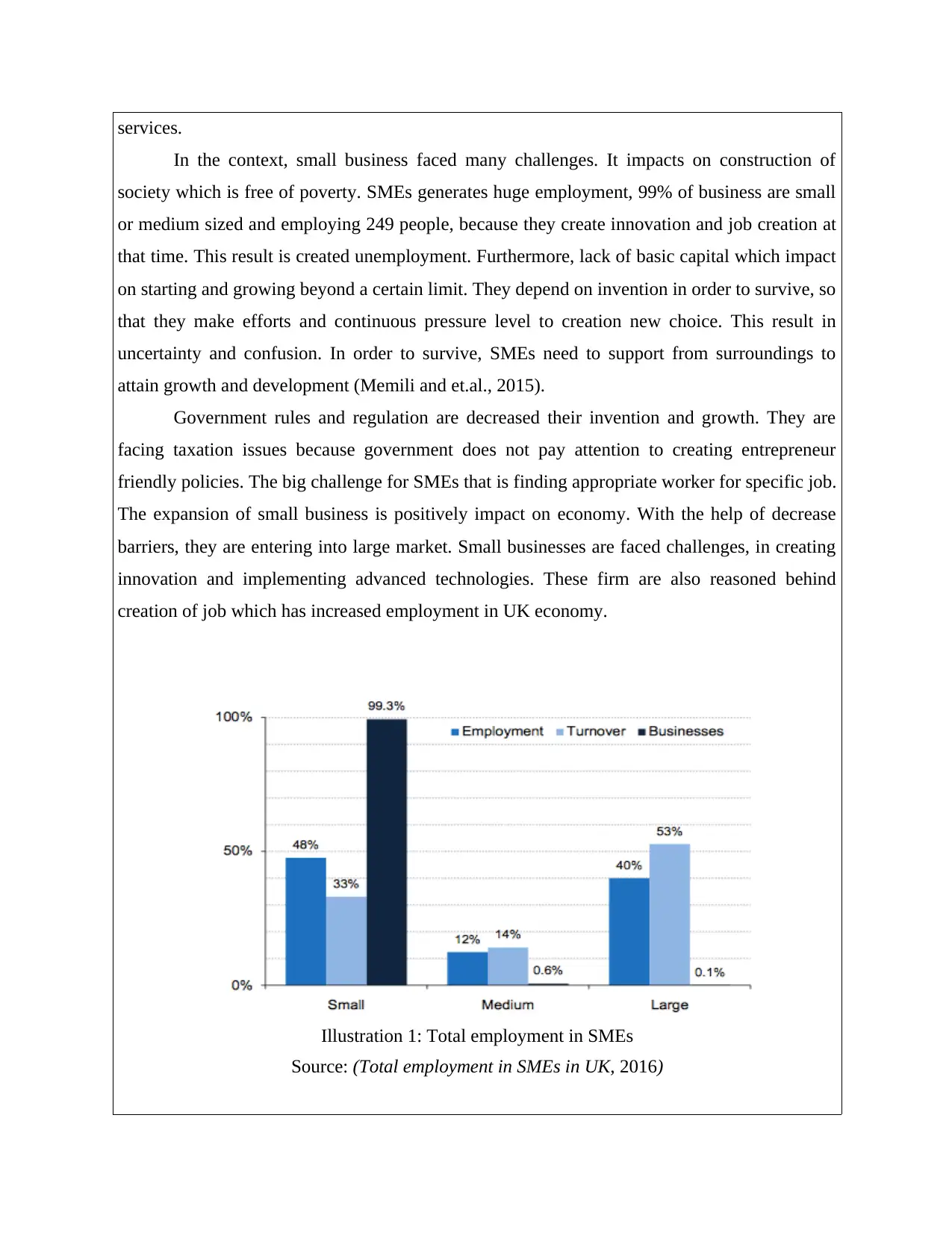
services.
In the context, small business faced many challenges. It impacts on construction of
society which is free of poverty. SMEs generates huge employment, 99% of business are small
or medium sized and employing 249 people, because they create innovation and job creation at
that time. This result is created unemployment. Furthermore, lack of basic capital which impact
on starting and growing beyond a certain limit. They depend on invention in order to survive, so
that they make efforts and continuous pressure level to creation new choice. This result in
uncertainty and confusion. In order to survive, SMEs need to support from surroundings to
attain growth and development (Memili and et.al., 2015).
Government rules and regulation are decreased their invention and growth. They are
facing taxation issues because government does not pay attention to creating entrepreneur
friendly policies. The big challenge for SMEs that is finding appropriate worker for specific job.
The expansion of small business is positively impact on economy. With the help of decrease
barriers, they are entering into large market. Small businesses are faced challenges, in creating
innovation and implementing advanced technologies. These firm are also reasoned behind
creation of job which has increased employment in UK economy.
Illustration 1: Total employment in SMEs
Source: (Total employment in SMEs in UK, 2016)
In the context, small business faced many challenges. It impacts on construction of
society which is free of poverty. SMEs generates huge employment, 99% of business are small
or medium sized and employing 249 people, because they create innovation and job creation at
that time. This result is created unemployment. Furthermore, lack of basic capital which impact
on starting and growing beyond a certain limit. They depend on invention in order to survive, so
that they make efforts and continuous pressure level to creation new choice. This result in
uncertainty and confusion. In order to survive, SMEs need to support from surroundings to
attain growth and development (Memili and et.al., 2015).
Government rules and regulation are decreased their invention and growth. They are
facing taxation issues because government does not pay attention to creating entrepreneur
friendly policies. The big challenge for SMEs that is finding appropriate worker for specific job.
The expansion of small business is positively impact on economy. With the help of decrease
barriers, they are entering into large market. Small businesses are faced challenges, in creating
innovation and implementing advanced technologies. These firm are also reasoned behind
creation of job which has increased employment in UK economy.
Illustration 1: Total employment in SMEs
Source: (Total employment in SMEs in UK, 2016)
⊘ This is a preview!⊘
Do you want full access?
Subscribe today to unlock all pages.

Trusted by 1+ million students worldwide
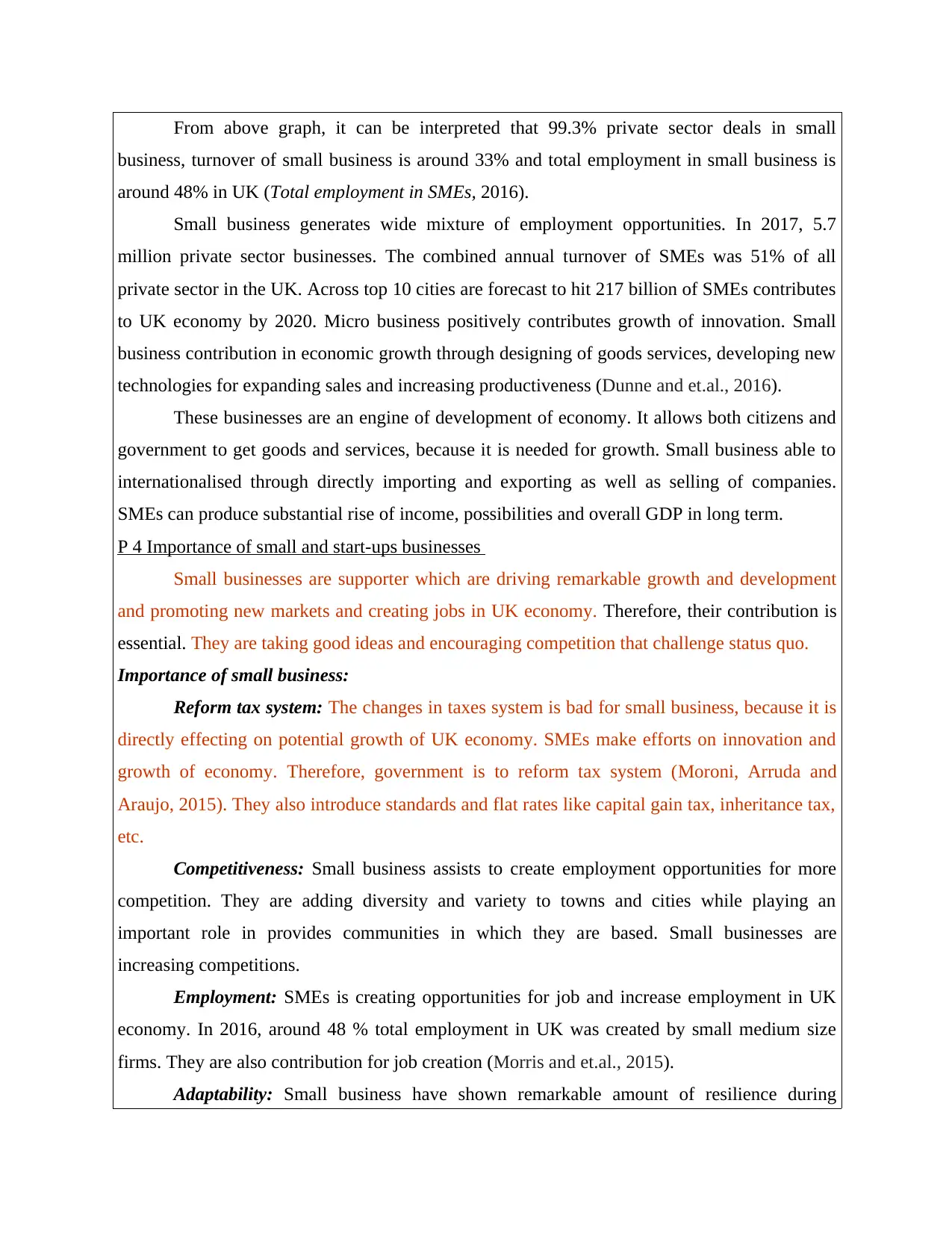
From above graph, it can be interpreted that 99.3% private sector deals in small
business, turnover of small business is around 33% and total employment in small business is
around 48% in UK (Total employment in SMEs, 2016).
Small business generates wide mixture of employment opportunities. In 2017, 5.7
million private sector businesses. The combined annual turnover of SMEs was 51% of all
private sector in the UK. Across top 10 cities are forecast to hit 217 billion of SMEs contributes
to UK economy by 2020. Micro business positively contributes growth of innovation. Small
business contribution in economic growth through designing of goods services, developing new
technologies for expanding sales and increasing productiveness (Dunne and et.al., 2016).
These businesses are an engine of development of economy. It allows both citizens and
government to get goods and services, because it is needed for growth. Small business able to
internationalised through directly importing and exporting as well as selling of companies.
SMEs can produce substantial rise of income, possibilities and overall GDP in long term.
P 4 Importance of small and start-ups businesses
Small businesses are supporter which are driving remarkable growth and development
and promoting new markets and creating jobs in UK economy. Therefore, their contribution is
essential. They are taking good ideas and encouraging competition that challenge status quo.
Importance of small business:
Reform tax system: The changes in taxes system is bad for small business, because it is
directly effecting on potential growth of UK economy. SMEs make efforts on innovation and
growth of economy. Therefore, government is to reform tax system (Moroni, Arruda and
Araujo, 2015). They also introduce standards and flat rates like capital gain tax, inheritance tax,
etc.
Competitiveness: Small business assists to create employment opportunities for more
competition. They are adding diversity and variety to towns and cities while playing an
important role in provides communities in which they are based. Small businesses are
increasing competitions.
Employment: SMEs is creating opportunities for job and increase employment in UK
economy. In 2016, around 48 % total employment in UK was created by small medium size
firms. They are also contribution for job creation (Morris and et.al., 2015).
Adaptability: Small business have shown remarkable amount of resilience during
business, turnover of small business is around 33% and total employment in small business is
around 48% in UK (Total employment in SMEs, 2016).
Small business generates wide mixture of employment opportunities. In 2017, 5.7
million private sector businesses. The combined annual turnover of SMEs was 51% of all
private sector in the UK. Across top 10 cities are forecast to hit 217 billion of SMEs contributes
to UK economy by 2020. Micro business positively contributes growth of innovation. Small
business contribution in economic growth through designing of goods services, developing new
technologies for expanding sales and increasing productiveness (Dunne and et.al., 2016).
These businesses are an engine of development of economy. It allows both citizens and
government to get goods and services, because it is needed for growth. Small business able to
internationalised through directly importing and exporting as well as selling of companies.
SMEs can produce substantial rise of income, possibilities and overall GDP in long term.
P 4 Importance of small and start-ups businesses
Small businesses are supporter which are driving remarkable growth and development
and promoting new markets and creating jobs in UK economy. Therefore, their contribution is
essential. They are taking good ideas and encouraging competition that challenge status quo.
Importance of small business:
Reform tax system: The changes in taxes system is bad for small business, because it is
directly effecting on potential growth of UK economy. SMEs make efforts on innovation and
growth of economy. Therefore, government is to reform tax system (Moroni, Arruda and
Araujo, 2015). They also introduce standards and flat rates like capital gain tax, inheritance tax,
etc.
Competitiveness: Small business assists to create employment opportunities for more
competition. They are adding diversity and variety to towns and cities while playing an
important role in provides communities in which they are based. Small businesses are
increasing competitions.
Employment: SMEs is creating opportunities for job and increase employment in UK
economy. In 2016, around 48 % total employment in UK was created by small medium size
firms. They are also contribution for job creation (Morris and et.al., 2015).
Adaptability: Small business have shown remarkable amount of resilience during
Paraphrase This Document
Need a fresh take? Get an instant paraphrase of this document with our AI Paraphraser
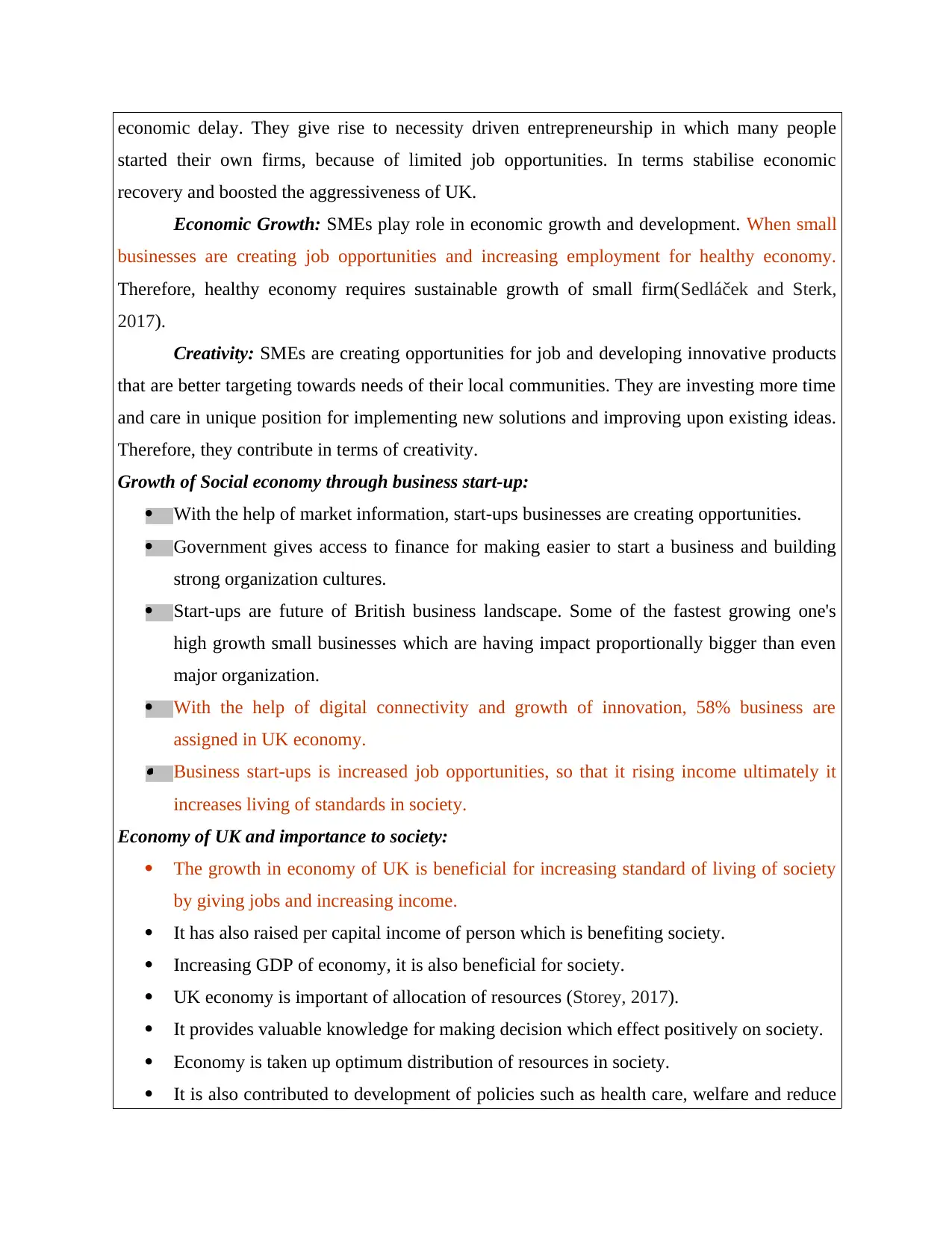
economic delay. They give rise to necessity driven entrepreneurship in which many people
started their own firms, because of limited job opportunities. In terms stabilise economic
recovery and boosted the aggressiveness of UK.
Economic Growth: SMEs play role in economic growth and development. When small
businesses are creating job opportunities and increasing employment for healthy economy.
Therefore, healthy economy requires sustainable growth of small firm(Sedláček and Sterk,
2017).
Creativity: SMEs are creating opportunities for job and developing innovative products
that are better targeting towards needs of their local communities. They are investing more time
and care in unique position for implementing new solutions and improving upon existing ideas.
Therefore, they contribute in terms of creativity.
Growth of Social economy through business start-up:
With the help of market information, start-ups businesses are creating opportunities.
Government gives access to finance for making easier to start a business and building
strong organization cultures.
Start-ups are future of British business landscape. Some of the fastest growing one's
high growth small businesses which are having impact proportionally bigger than even
major organization.
With the help of digital connectivity and growth of innovation, 58% business are
assigned in UK economy. Business start-ups is increased job opportunities, so that it rising income ultimately it
increases living of standards in society.
Economy of UK and importance to society:
The growth in economy of UK is beneficial for increasing standard of living of society
by giving jobs and increasing income.
It has also raised per capital income of person which is benefiting society.
Increasing GDP of economy, it is also beneficial for society.
UK economy is important of allocation of resources (Storey, 2017).
It provides valuable knowledge for making decision which effect positively on society.
Economy is taken up optimum distribution of resources in society.
It is also contributed to development of policies such as health care, welfare and reduce
started their own firms, because of limited job opportunities. In terms stabilise economic
recovery and boosted the aggressiveness of UK.
Economic Growth: SMEs play role in economic growth and development. When small
businesses are creating job opportunities and increasing employment for healthy economy.
Therefore, healthy economy requires sustainable growth of small firm(Sedláček and Sterk,
2017).
Creativity: SMEs are creating opportunities for job and developing innovative products
that are better targeting towards needs of their local communities. They are investing more time
and care in unique position for implementing new solutions and improving upon existing ideas.
Therefore, they contribute in terms of creativity.
Growth of Social economy through business start-up:
With the help of market information, start-ups businesses are creating opportunities.
Government gives access to finance for making easier to start a business and building
strong organization cultures.
Start-ups are future of British business landscape. Some of the fastest growing one's
high growth small businesses which are having impact proportionally bigger than even
major organization.
With the help of digital connectivity and growth of innovation, 58% business are
assigned in UK economy. Business start-ups is increased job opportunities, so that it rising income ultimately it
increases living of standards in society.
Economy of UK and importance to society:
The growth in economy of UK is beneficial for increasing standard of living of society
by giving jobs and increasing income.
It has also raised per capital income of person which is benefiting society.
Increasing GDP of economy, it is also beneficial for society.
UK economy is important of allocation of resources (Storey, 2017).
It provides valuable knowledge for making decision which effect positively on society.
Economy is taken up optimum distribution of resources in society.
It is also contributed to development of policies such as health care, welfare and reduce

pollution and crime.
⊘ This is a preview!⊘
Do you want full access?
Subscribe today to unlock all pages.

Trusted by 1+ million students worldwide
1 out of 16
Related Documents
Your All-in-One AI-Powered Toolkit for Academic Success.
+13062052269
info@desklib.com
Available 24*7 on WhatsApp / Email
![[object Object]](/_next/static/media/star-bottom.7253800d.svg)
Unlock your academic potential
Copyright © 2020–2026 A2Z Services. All Rights Reserved. Developed and managed by ZUCOL.




